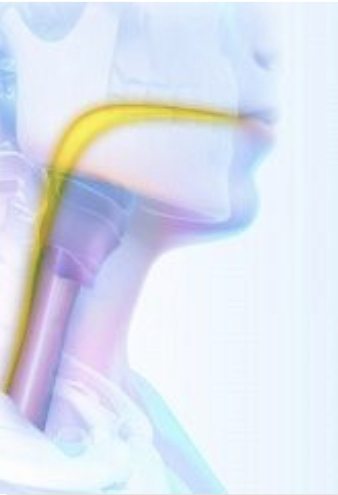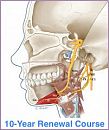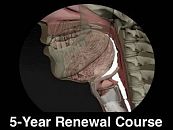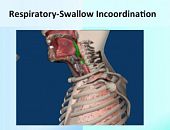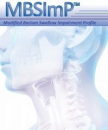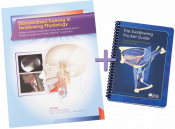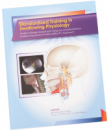Translating MBS Study Results Into Targeted Treatment: Evidence-Based Interventions Using The MBSImP™ Approach #e012
Presenters: Bonnie Martin-Harris, PhD, CCC-SLP, BCS-S, ASHA Honors & Kate Davidson, MS, CCC-SLP
Translate MBS study results into physiologically targeted treatment.
This course is appropriate for SLPs who assess and/or treat adult patients with dysphagia. Completion of the MBSImP™ Standardized Training is a suggested prerequisite, though not a requirement. The 17 MBSImP™ components of swallowing are referenced throughout this course and prior knowledge of the components and their associated scoring metric is beneficial to course participants.
The first portion of this course overviews frontline interventions and the physiologic swallow components for which they are appropriate. Discussed are compensation and retraining strategies to target specific components of the swallowing mechanism (MBSImP™ Components). The presentation expands to discuss strength training, skill training, and programmatic & intensive multi-modality interventions.
The second portion of this course will present patient case studies. Based on patient MBS Study results, participants are guided through selection of targeted interventions and treatment planning. Discussion will include MBSImP™ component-scores and PA Scale results, and how this information is used in developing a targeted intervention plan to include diet recommendations (IDDSI levels), compensatory strategies, and retraining interventions. Short and long-term goals are outlined in detail for each case study. Focus is the adult population.
Offered for 0.5 ASHA CEUs – 5 contact hours.
Prior MBSImP™ Training enrollees (course #e01) receive a $20 discount. Discount is applied automatically after login.
Course Overview & Run Time
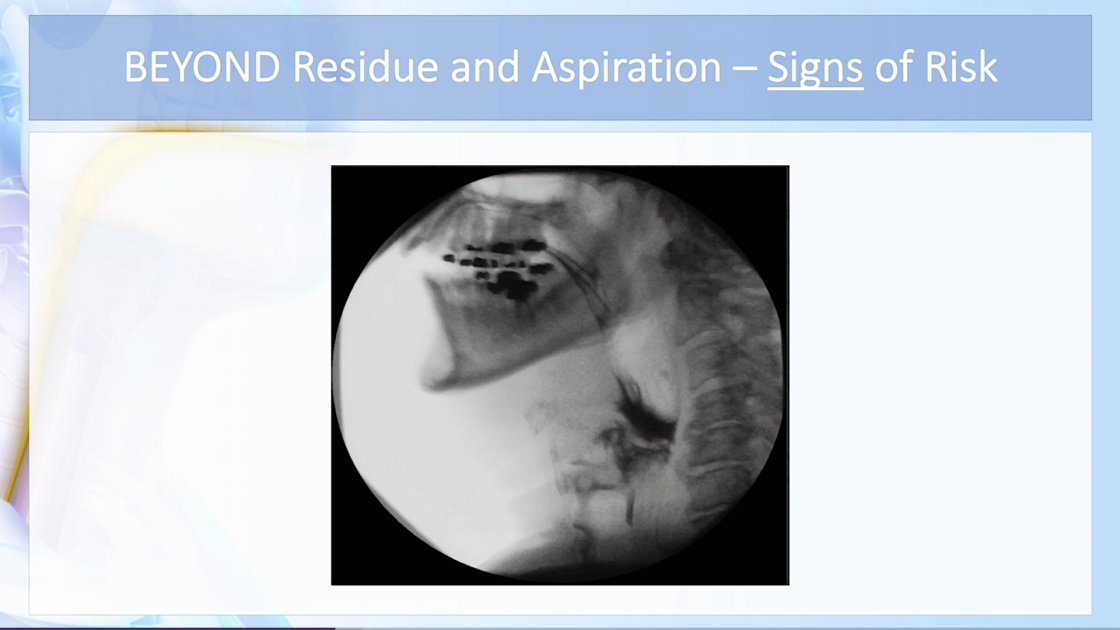
Course Overview – Run Time: 5:03:10
- Systematic approach to dysphagia management.
- Translation of physiologic impairment into targeted interventions.
- Frontline tactics including compensatory adaptations.
- Strength and skill-based retraining approaches.
- Device driven approaches to dysphagia management.
- Guided interpretation of MBSS findings into targeted interventions.
- Treatment planning and goal writing.
"The case studies were very helpful. I felt that I could implement the goal-writing immediately. I liked that there was the possibility of a systematic approach when treating swallowing disorders."
– K.D., prior course participant
Read more comments about this course!
"The content and quality of the case studies were exceptional! This course was thorough, relevant, and extremely useful in thinking through therapeutic intervention for dysphagia."
– M.K., prior course participant
Read more comments about this course!
This course includes frequent references to the MBSImP™ standardized component-score metric. Prior knowledge in this approach is beneficial, but not a requirement for course participation. Presenter financial and non-financial disclosures may be found in the Presenter & Disclosures area.
Video PowerPoint presentation with author narration & downloadable handout. Stop and re-start the course at any point. Learners retain access to course content after completion for ongoing reference and review.
Reviews
"The link of the MBSImP impairment profile to the different techniques for rehab was most helpful. I liked that I could do course at my own tempo." I.J. (Jun. 2025)
"It was most beneficial shifting thinking of targeted intervention to use information obtained from the MBSImP into patient specific therapy. I liked being able to go at my own pace; rewind/review information as needed." L.M. (May 2025)
"Going over the specificity of swallow rehab according to deficits was most valuable. I liked the details, examples." J.B. (May 2025)
"Literally all of the course was beneficial. I especially enjoyed the portion on respiratory timing as well as linking imaging with treatment." D.S. (Apr. 2025)
"I appreciated the helpful framework to think about dysphagia. I liked the breakdown into smaller parts." M.M. (Apr. 2025)
"All course material will benefit my daily practice. Detailed overview of therapy approaches to dysphagia management and treatment planning/goal writing." E.J. (Mar. 2025)
"The case studies were so helpful. Thank you for a great course." S.C. (Mar. 2025)
"Actually talking about interventions instead of theories was beneficial." B.D. (Mar. 2025)
"Beneficial discussion and application of biofeedback. I liked the case studies." K.P. (Mar. 2025)
"A systematic review of the techniques available, based on the pathophysiological mechanisms involved and clinical observations. The establishment of clear treatment objectives. Information on the duration and repetition required to obtain results. I liked the combination of theoretical information and numerous practical cases presented in a clear and comprehensive manner." C.F. (Jan. 2025)
"Discussing specific exercises that do not require electronic equipment was helpful. I enjoyed the ability to access the course when it was convenient." J.M. (Jan. 2025)
"I was grateful for the literature/review of evidence." K.B. (Dec. 2024)
"Exercise programs were helpful and I liked the case studies." T.G. (Dec. 2024)
"Better understanding now when to use specific frontline compensations, as well as better ways to write goals. I liked having a thorough review of compensatory strategies and strength-based and skilled-based interventions." D.W. (Dec. 2024)
"Research explanations, case studies and descriptions of intervention plans." J.D. (Dec. 2024)
"Goal writing and specific exercises for the impairment. I liked the pace and videos." C.J. (Dec. 2024)
"Principles of neuroplasticity were helpful to discuss. I liked the case studies/practical application discussions." S.H. (Nov. 2024)
"Beneficial discussion re: specific interventions for each MBSImP component. Slides are always helpful." K.P. (Nov. 2024)
"The breakdown of treatment paradigms to compensatory, strength training, surgical, etc. I liked the case studies!" K.M. (Nov. 2024)
"I have a better understanding now how to interpret the MBS. I liked the style of presentation and examples." S.S. (Oct. 2024)
"I found the use of actual case studies and subsequent goals to be very practical. I liked the use of videos, imaging studies and timely discussions." M.N. (Oct. 2024)
"Details on strength and skill-based interventions were helpful. Practical application." L.F. (Oct. 2024)
"The portion on case studies was helpful as it was an opportunity to link all the knowledge taught in the course." C.D. (Sep. 2024)
"The tying in of all information and use of EBP was helpful. I liked the format." B.P. (Sep. 2024)
"Discussing which exercises can be used to target specific impairments was beneficial." C.B. (Sep. 2024)
"Swallowing rehabilitation based on MBSImP assessment was beneficial. I liked the principles of intervention." Y.W. (Sep. 2024)
"I liked the specific techniques to use for each swallow component." C.D. (Sep. 2024)
"Training approaches were helpful. I liked that the course could be done in segments." L.O. (Aug. 2024)
"Particularly beneficial was how each MBSS target was divided into compensatory/retraining exercises. I liked that the course could be done independently and at each person's own time." A.B. (Aug. 2024)
"Frontline tactics was a good topic, gave me ideas on what I can do during the study in real time. I appreciated the case studies, seeing how to make the most appropriate SMART goals." K.S. (Jul. 2024)
"This is all wonderful information as we frequently do MBSS and then see the same patients for treatment. Organized well." K.P. (Jul. 2024)
"The discussion of frontline tactics will probably be the most beneficial and applicable to my acute care practice; and also the discussion of strength and skill training. I liked that course was self-directed and that I could complete it over the long term." L.D. (Jul. 2024)
"Going through all the interventions and literature, and understanding the rationale behind every intervention was beneficial. The course was very thorough." K.K. (Jul. 2024)
"Case studies were helpful and I liked that I was able to complete at my own pace during downtimes at work." P.A. (Jul. 2024)
"I liked the specific exercises that target the specific components from the MBSImP." A.W. (Jul. 2024)
"Utilizing MBSS to determine POC was helpful. I liked the different examples of tx based on the impairment." D.G. (Jul. 2024)
"All of the information was beneficial. I liked the presenter." J.P. (Jul. 2024)
"The breakdown of compensation and retraining recommendations for various components along the MBSIMP scoring sheet. I also enjoyed the case studies at the end of the course with review of results. This really helped to put all of the information together. The breakdown of each scoring component of the MBSImP and how to address the deficits found to improve pt outcomes." S.B. (Jul. 2024)
"I liked the organization, graphics, and case studies." S.W. (Jun. 2024)
"I enjoyed learning about the case studies part of the course. This gives me a better idea on how to apply MBSImP results to therapy. The course was very informative and organized." E.T. (Jun. 2024)
"The differentiation between compensatory strategies and retraining was beneficial. This course was very comprehensive! I feel more confident approaching dysphagia interventions now." H.M. (Jun. 2024)
"The case study and the write-up of short-term goals in a more specific method to plan for swallowing rehab was helpful." O.K. (Jun. 2024)
"Review of physiology guiding targeted treatment was beneficial. I enjoyed the videos/case studies." A.W. (May 2024)
"I recently became MBSImP trained, so linking the impairments to treatment is very helpful. I liked that the course was straightforward." L.M. (May 2024)
"EBP therapy was a beneficial topic discussed. I enjoyed the case studies and breakdown of tx targets." S.K. (May 2024)
"Maneuvers and therapy strategies were beneficial. Easy to stop and repeat the course." G.M. (Apr. 2024)
"Treatment plans were helpful. The information directly related to my caseload." A.G. (Apr. 2024)
"I liked the view of Images. Clear and concise information." D.N. (Apr. 2024)
"The targeted intervention plan based on physiology was helpful. I liked the case study examples." A.C. (Apr. 2024)
"The specific techniques used for physiological impairment were beneficial to discuss. I liked the listed references that you could refer back to to treat each component." M.G. (Apr. 2024)
"Reviewing research based retraining methods based upon component scores AND goal writing. I like how the sections were determined. The course content was thorough and very applicable to clinical experiences." L.T. (Apr. 2024)
"All of the course was beneficial! After completing the MBSImP it was nice to be able to translate that knowledge! This course was easy to access and can be revisited as needed!" A.M. (Apr. 2024)
"I enjoyed the refresh on which strategies to try for different areas of breakdown, and the information on the variety of treatment options available. Able to do course in my own time, at my own pace. Clear slides. Easy to digest information." E.M. (Apr. 2024)
"I liked the content, clarity, and accessibility." H.B. (Apr. 2024)
"Learning which compensatory strategies and maneuvers to use for different pathologies was beneficial. I enjoyed the video/visual components." M.T. (Mar. 2024)
"Therapeutic interventions with MBS video side by side. Useful in daily clinic." A.M. (Mar. 2024)
"I liked the case studies. This course was easy to access." A.J. (Mar. 2024)
"Interventions were beneficial. The course was comprehensive." M.G. (Feb. 2024)
"Application of treatment methods and case studies were all beneficial." D.S. (Feb. 2024)
"The treatment approaches were beneficial. I enjoyed the simplicity of content." E.H. (Feb. 2024)
"Specific exercises and compensatory strategies for specific impairments. I liked the lectures." M.M. (Jan. 2024)
"Mapping impairment to proper modification or strength target. I liked the visuals!" M.O. (Jan. 2024)
"Association between specific impairments noted in the MBS and targeted exercises to address in treatment." J.W. (Jan. 2024)
"Goal writing was helpful. Clearly organized course." I.D. (Jan. 2024)
"I enjoyed the case studies." A.M. (Jan. 2024)
"Compensatory Interventions such as modifying food and liquids, sensory stimulation, and altering postures were beneficial to discuss. I liked the accessibility of the course and how it worked in my schedule." E.H. (Jan. 2024)
"Translating MBSImP impairments into immediate targeted goals for safe PO intake at the acute care phase was helpful. I liked the written handouts, video examples, and option for closed captioning." C.C. (Dec. 2023)
"I appreciated the review of targeted components with frontline tactics. I liked the identification of specific interventions based on the pathology." S.M. (Dec. 2023)
"Breaking down compensation versus retraining for each component of MBSImP was fantastic! Great visuals, clearly presented. I am very pleased with the course. I liked the case studies!" E.L. (Dec. 2023)
"Learning which treatments target the specific areas of deficit was beneficial. I liked how all the compensatory and rehabilitation strategies were applied directly to the areas of deficit identified." A.D. (Dec. 2023)
"Evidence of different interventions - when to use them and considerations for use. I liked the video examples of the impact of maneuvers - particularly in FEES view. Case studies with before and after MBSImP scores." L.A. (Dec. 2023)
"I really enjoyed the patient profiles. I liked everything, and how I could go at my own pace." A.S. (Dec. 2023)
"Explanation of which swallowing exercises are beneficial for impairments in which MBSImP components were beneficial. The course was very clearly laid out and presented, and it was practical for my daily clinical use." H.T. (Dec. 2023)
"The selection of interventions to target specific MBSImP components was helpful. I liked the case presentations." C.L. (Dec. 2023)
"Being able to translate assessment results from MBSS to targeted tx was beneficial. I enjoyed the thorough explanations, examples given, and case studies." J.F. (Nov. 2023)
"Rehab was a helpful topic. I liked how accessible the course was." M.R. (Nov. 2023)
"I enjoyed the overall translation of MBS findings into therapy activities." M.F. (Nov. 2023)
"A comprehensive review of how each component of the disordered swallow is related to the therapeutic approaches. Easy to follow thanks to the visuals." O.J. (Nov. 2023)
"Application of pathophysiology-directed treatment. I liked the case studies." D.S. (Nov. 2023)
"Translating which components can be targeted by different oral-pharyngeal exercises. There were many examples and repetition to retain information." K.A. (Nov. 2023)
"Indications for specific exercises and maneuvers. The practice cases were beneficial." S.S. (Oct. 2023)
"Specific exercises and targeted treatment based on VFSS results. I liked the review of the pathophysiology underlying and the research cited." L.T. (Oct. 2023)
"I liked the review of skill-based and retraining interventions as well as compensations. And the case study examples." L.L. (Oct. 2023)
"I really enjoyed the section where the different maneuvers were discussed and how these maneuvers help where the different deficits are located." M.D. (Oct. 2023)
"EBP treatment options - very helpful for listing out treatments per impairment(s). Very thorough course. Case studies were helpful!" A.H. (Oct. 2023)
"Applying principles of MBSImP to patient-specific therapy was beneficial. I liked the narration and video content of example swallows." C.W. (Oct. 2023)
"I liked the available evidence relating to treatment options." K.J. (Oct. 2023)
"This course was excellent. I liked the case studies w/ diagnostics to treatment POCs and rationale." L.I. (Sep. 2023)
"The strategies and maneuvers related to specific impairments were beneficial. I liked the review of MBSImP and detailed exercises, especially ones that don’t require equipment during relatively short acute stays." J.P. (Sep. 2023)
"Determining treatment approaches based on physiologic impairment as observed during the MBSS. I liked the presentation of the case studies." K.S. (Sep. 2023)
"Good overview of treatment options. I liked viewing the MBSImP study videos before, during and after treatment." V.O. (Sep. 2023)
"Discussing which strengthening tasks coincide with certain deficit areas was helpful. I liked that the course went step-by-step through all the 17 areas of the MBSImP and what to target in treatment for each." M.M. (Sep. 2023)
"Most relevant CEU course I have ever taken." C.F. (Aug. 2023)
"Interventions for dysphagia management. I liked the manner in which course was presented - easy to follow." A.D. (Aug. 2023)
"Translating MBS results into treatment plans & goals. Videos and case studies were beneficial." E.W. (Aug. 2023)
"Postural recommendations for appropriate patients was beneficial. I liked the video demonstrations of improvement using strategies. And learning about wearable tech and biofeedback." S.B. (Jul. 2023)
"Practical information, especially the case studies. Translating assessment results was beneficial." R.W. (Jul. 2023)
"Informative and practical. All of the content was really helpful." H.C. (Jul. 2023)
"Intervention and targeted practice for patients with dysphagia. The various VFSS videos helped to explain further and better my understanding of why the MBS study is important." L.P. (Jul. 2023)
"Related treatment techniques to each of the 17 components of the swallow per MBSImP. I appreciated the emphasis on research." E.K. (Jul. 2023)
"I enjoyed the targeted treatment plans and examples of SMART goals. Explanations of which exercises are supported by research and when to use each one." K.G. (Jun. 2023)
"Learning impact of different types of swallowing treatment and the evidence. I liked the visual representation." K.M. (Jun. 2023)
"I thought the slides on oropharyngeal exercises and which physiologic areas they target specifically to be very helpful. I appreciated the real cases and MBS studies to help illustrate course information." L.G. (Jun. 2023)
"Thorough and informative course. Skill vs. strength training was beneficial to discuss." A.S. (Jun. 2023)
"Excellent course. The case studies were super helpful. I loved the application of the clinical knowledge to case studies." A.S. (May 2023)
"Lots of good information. Compensation and retraining exercises that target each individual MBSImP component." C.K. (May 2023)
"Learning which treatment activities match to components on the MBSImP and which strength training devices are available for swallowing treatment. I liked that I was able to complete this course at my own pace. Use of materials and examples were clear and illustrated the information." D.B. (May 2023)
"Linking the MBSImP component with strategies and targeted treatment. Translating assessment results to physiologically targeted treatment, strength training, skill training, intensive multi-modality interventions, and the case studies were all beneficial." L.C. (May 2023)
"The entire presentation was beneficial. I liked how this course reviewed MBS and went into detail about what was actually visualized." T.C. (Apr. 2023)
"Correlation of MBS with treatment recommendations. I liked the detailed information." K.V. (Apr. 2023)
"Pharyngeal contraction exercises were beneficial. I liked how the course was laid out. Very easy to understand." J.D. (Mar. 2023)
"Very thorough course. I liked the information on picking skill and strength training exercises based on the MBSImP components." F.B. (Mar. 2023)
"The MBS slides, documentation, goal writing, and tx plan were beneficial. Liked that I could do the course at my own pace and refer back to it." B.G. (Mar. 2023)
"Specific treatment goals. I liked the case studies." J.B. (Mar. 2023)
"Identifying specific exercises for targeted areas. All of the evidence! EBP!" A.A. (Mar. 2023)
"Therapy recommendations based on MBSImP results." T.L. (Feb. 2023)
"Very pertinent to my daily practice. I liked the biofeedback." J.W. (Feb. 2023)
"Converting MBS results to targeted treatment. Examples, treatment plans, and actual pre and post treatment results." B.B. (Feb. 2023)
"Great visuals, easy to understand step-by-step procedures. Knowledge of A&P, how and when to use specific types of direct therapy for patients with dysphagia." S.V. (Feb. 2023)
"Recommendations for short term goals and objectives based on MBSS results from case studies. Really good quality video/graphics with case study MBSS's." J.A. (Feb. 2023)
"I liked the MBS videos in the case studies." M.W. (Jan. 2023)
"Discussion on treatment plans with long and short term goals and treatment objectives. Good organization and examples w/video." A.M. (Jan. 2023)
"Course goes into lots of detail about different interventions. Going through individual MBSImP components and relating them to therapy was beneficial." C.H. (Jan. 2023)
"The case studies were great - translating observations and MBSImP scores into targeted tx." M.F. (Dec. 2022)
"Lots of useful information. I liked the discussion of strategies and compensations that are useful and how they are evidence based." S.B. (Dec. 2022)
"Correlating MBSImP data points (scores) with interventions. Practical, as I have recently completed the MBSImP course." J.B. (Dec. 2022)
"The case studies were very practical and useful. I liked how I was able to complete course at my own pace." V.G. (Dec. 2022)
"Review of principles of neuroplasticity was beneficial." E.L. (Dec. 2022)
"I liked the case studies of patients in the acute care setting." A.B. (Dec. 2022)
"Lots of VFSS to look at and consider therapy approaches." N.F. (Dec. 2022)
"Research-based benefits of specific exercises. Course was well organized." W.K. (Nov. 2022)
"The detailed explanation of retraining strategies for impairments was helpful." R.M. (Nov. 2022)
"I liked discussion of strength training. Good examples." S.H. (Nov. 2022)
"I liked the types of strategies listed under each component and the convenience of taking the course online." K.M. (Oct. 2022)
"I liked the ability to stop/start between each presentation. And linking specific impairment to exercises." V.C. (Oct. 2022)
"The format of the course was excellent!" L.Y. (Oct. 2022)
"I liked the pace, the case studies, the videos, the rating scales, descriptions, format, and flow. The course was easy to follow." K.H. (Sept. 2022)
"All of the content was very beneficial and I was able to do it according to my schedule." P.S. (Sept. 2022)
"Treatment approaches based on the MBSImP impairments - I learned how to apply these results to treatment. The course format was helpful and the explanations for treatment approaches were clear." L.F. (Sept. 2022)
"The content of this course will benefit my daily practice once I have the opportunity to work in a medical setting. I liked that it gave potential treatments to address underlying causes of the pathophysiologies identified during MBS." L.A. (Sept. 2022)
"This course was easy to follow. Liked the specific treatment techniques for specific components of the MBSImP." M.R. (Sept. 2022)
"I liked the powerpoint." C.C. (Sept. 2022)
"I liked the videos to go along with explanations of where the disorder is. And determining recommendations for exercises after a MBS." K.K. (Sept. 2022)
"The huge amount of information on swallowing treatment was great, the flow of information in the course is smooth, and it included almost all known therapy approaches for swallowing." A.A. (Aug. 2022)
"Everything was good. What a plethora of information! This was a great course, so much information, charts, the associated videofluoroscopy swallowing studies, outlined goals etc! Thank you so much!" R.H. (Aug. 2022)
"Very informative & useful information! Compensations & retraining exercises specific to each component and with rationale! Liked going through the case studies." A.H. (Aug. 2022)
"I liked that this course covered specific interventions, and that I could go at my own pace." B.M. (Aug. 2022)
"The case studies, the content, and delivery were particularly helpful." E.N. (Aug. 2022)
"The case studies were interesting and I appreciated the review of the different interventions." J.P. (Aug. 2022)
"Updated evidence based treatment methods; use of actual MBSs to reinforce information; breakdown of the information was excellent." C.B. (Aug. 2022)
"The content and quality of the case studies were exceptional! This course was thorough, relevant, and extremely useful in thinking through therapeutic intervention for dysphagia." M.K. (July 2022)
"Learning the breakdown of the 17 physiologic components of the swallow, the what/where/when of each and then the examples of how these would be rated using an example MBSS. I like that I could complete the course at my own pace and I could repeat sections as needed. I also appreciate the downloadable materials that I can now use and reference in my clinical practice." K.F.-H. (July 2022)
"The course is very well done. All of the content was very beneficial." D.P. (July 2022)
"I loved and really connected to the beginning when our skills as SLPs were validated and highlighted to the highest extent. We are so commonly mistaken as professionals who are "just looking for aspiration" by the doctors at the hospital and they have no idea the level of detail we are assessing!" E.R. (June 2022)
"I loved EVERYTHING about the course! Especially the detailed breakdown of each component from MBSImP and how to treat it. I also like all the great research resources." E.R. (June 2022)
"I enjoyed the case studies, followed by specific goals/plans for patient care. I liked the expertise of the presenters. I know the information is accurate and reliable." M.B. (June 2022)
"I liked the practical applications of therapy (compensatory and behavioral)." L.M. (June 2022)
"Concise content, rich examples, detailed information, based on evidence-based medicine." H.H. (May 2022)
"I liked that I could proceed at my own pace as it is on-demand; exercises that specifically target the components; mention of biofeedback and types; included some innovations in treatment." L.C. (May 2022)
"This was all very relevant and thorough. I liked the strategies to use for various impairments." S.K. (May 2022)
"The application practices are extremely helpful. Clear, precise information. Well done!" T.K. (May 2022)
"I liked the review of dysphagia components and the case studies." B.W. (May 2022)
"I liked the connection between MBSImP scores and treatment targets via presenting the case studies." A.C. (Apr. 2022)
"I liked the frontline tactics/compensatory strategies, and how it is divided into different types of treatment." L.M. (Apr. 2022)
"All material was relevant and well structured. I liked the literature reviews and useable resources." S.S. (Apr. 2022)
"I liked being able to review cases and videos and see the treatment options planned as a result. I liked that I could access it when able to, around other work commitments." C.C. (Mar. 2022)
"Evidence-based practice of treatment. Flexible pace of learning." W.L. (Mar. 2022)
"My skills as a clinician will be improved by the connection between impairments seen on the MBSS and strengthening/retraining interventions directly targeting these deficits." W.E. (Feb. 2022)
"I liked the review of anatomy of the swallow in detail, and the interventions suggested. Easy to access – material easy to follow and process." L.A. (Feb. 2022)
"I liked the review of swallowing exercises and when to use them based on MBS findings. Introduction to treatment programs that were unfamiliar to me; appreciate the discussions on current research. Review of MBSImP components (although I recently finished training, so not as beneficial - but, the Compensation vs Retraining slides for each component was NICE!). CASE STUDIES! Very helpful in looking at a case from beginning to end." J.K. (Feb. 2022)
"I found it very beneficial to have case studies with a systematic approach to evaluation and treatment, including goal-writing. I liked that there were several case studies from start to finish." K.D. (Jan. 2022)
"The case studies were very helpful. I felt that I could implement the goal-writing immediately." T.D. (Jan. 2022)
"I liked using the specific components of the MBSImP to determine treatment targets. Easy to understand and salient to my daily practice as a medically based SLP." M.J. (Jan. 2022)
"I liked watching the MBSS and then seeing what therapy techniques would be used in therapy." H.B. (Jan. 2022)
Course Objectives
- Describe in detail the physiologic components of oropharyngeal and esophageal swallowing function.
- Identify evidence-based interventions that target specific physiologic components of swallowing.
- Translate MBSS findings into targeted, evidenced-based treatment.
- Recall the evidence underlying common compensatory and retraining dysphagia rehabilitation approaches.
- Describe innovative and emerging interventions for dysphagia management.
- Develop specific, measurable, attainable, realistic and timely goals based on findings from the MBSS record.
Presenter & Disclosures

Bonnie Martin-Harris, PhD, CCC-SLP, BCS-S, ASHA Honors, is the Alice Gabrielle Twight Professor in the Roxelyn and Richard Pepper Department of Communication Sciences and Disorders, and Associate Dean for Academic Affairs in the School of Communication at Northwestern University. She is also Professor, Otolaryngology-Head and Neck Surgery and Radiation Oncology, Feinberg School of Medicine.
She is a Past-President of the Dysphagia Research Society, past Chair of the Specialty Board for Board Certification in Swallowing and Swallowing Disorders (BCS-S), and Associate Editor for the Dysphagia Journal. She is an ASHA Fellow, recipient of the 2016 Admiral Albert J. Baciocco Innovation Award – Medical University of South Carolina (MUSC), The 2017 12th Annual Pepper Lecturer, Northwestern School of Communication, Honorary Member of the MUSC Chapter of The National Academy of Inventors, recipient of Honors from the South Carolina Speech-Language-Hearing Association (SCSHA), 2010 MUSC College of Health Professions Scholar of the Year Award, and associate member of the Academy of Otolaryngology-Head and Neck Surgery and the American Head and Neck Society.
Dr. Martin-Harris is the author and developer of the first standardized method for videofluoroscopic assessment of swallowing impairment (Modified Barium Swallowing Impairment Profile, MBSImP™), translated to research and clinical practice in the United States, Canada, and 13 additional countries. She is also the author of the manual, "Standardized Training In Swallowing Physiology—Evidence-Based Assessment Using The MBSImP Approach" published by Northern Speech Services. Her work is funded by the National Institutes on Deafness and Other Communication Disorders (NIDCD), the Veteran's Administration, and the Mark and Evelyn Trammell Foundation.
Presenter Disclosures:
Financial — Bonnie Martin-Harris is presenter of online CE courses sponsored by Northern Speech Services; receives royalties.
Financial — Bonnie Martin-Harris is the author of "Standardized Training In Swallowing Physiology — Evidence-Based Assessment Using The MBSImP Approach" published by Northern Speech Services; receives royalties.
Financial — Bonnie Martin-Harris' former employer, MUSC, receives royalties from Northern Speech related to enrollment tuition of the MBSImP Online Training.
Financial — Bonnie Martin-Harris' MBSImP research and development was funded in part by Bracco Diagnostics; received grant funding.
Financial — Bonnie Martin-Harris' research is funded in part by the Veteran's Administration (VA); receives grant and research funding.
Financial — Bonnie Martin-Harris' research is funded in part by the Mark and Evelyn Trammell Foundation; receives grant funding.
Financial — Bonnie Martin-Harris' research is funded in part by the National Institutes on Deafness and Other Communication Disorders (NIH/NIDCD); receives grant and research funding.
Nonfinancial — Bonnie Martin-Harris is associated with numerous journals, publications, and boards related to speech-language pathology; receives no compensation in these roles.
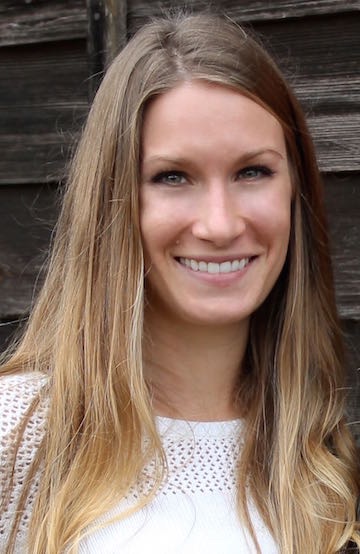
Kate Davidson, MS, CCC-SLP, is a Speech-Language Pathologist and Research Associate at the Medical University of South Carolina (MUSC) in Charleston, SC where she has practiced dysphagia management for over 10 years. In addition to her clinical role, Kate advises a cohort of post-doctoral, doctoral and graduate students as Assistant Lab Director of the Swallowing Cross-System Collaborative at Northwestern University in Evanston, IL. Kate received her master’s degree in communication sciences and Disorders from MUSC and completed her Clinical Fellowship under the direction of Bonnie Martin-Harris, PhD, Terry Day, MD and Julie Blair, MA. Her clinical focus is in adult swallowing disorders and her research interests include standardization of the videofluoroscopic swallow study and the use of high-resolution pharyngeal manometry as an assistive biofeedback device for swallow rehabilitation. She is a Modified Barium Swallow Study Impairment Profile (MBSImP™) consultant for Northern Speech Services, and a continuing education consultant for the High-Resolution Pharyngeal Manometry branch of Medtronic, Inc.
Speaker Disclosures:
Financial— Kate Davidson is presenter of online CE courses sponsored by Northern Speech Services; receives royalties.
Financial— Kate Davidson is employed by Medical University of South Carolina (MUSC); receives a salary.
Financial— Kate Davidson's employer, MUSC, receives royalties from Northern Speech related to enrollment tuition of the MBSImP Online Training.
Financial— Kate Davidson serves as a consultant to Northern Speech Services related to the MBSImP Training and supplementary materials; receives consulting fees.
Financial— Kate Davidson is a continuing education consultant with Medtronic, Inc; receives compensation in this role.
Nonfinancial— Kate Davidson has no relevant non-financial relationships to disclose.
Intended Audience / Accreditation

This program is offered for 0.5 ASHA CEUs (Intermediate Level; Professional Area).

Intended Audience
- Speech-Language Pathologists
ASHA CEUs:
Northern Speech online courses are registered with ASHA and are offered for ASHA CEUs. The number of ASHA CEUs is noted above. Note that 0.1 ASHA CEU = 1 contact hour = equals 1 CEE.
Earning ASHA CEUs and the ASHA CE Registry:
To earn CEUs from this course and have ASHA CEUs submitted to the ASHA CE Registry, course participants must satisfy each of these requirements:
- Participants must meet the eligibility requirements to earn ASHA CEUs (see below).
- Participants must indicate – prior to course completion – their intent for Northern Speech to submit this course to ASHA.
- Participants must complete/view this course in its entirety.
- Participants must complete the course post test with a minimum of 80% accuracy.
- After successful completion of the post test and completion of the course evaluation, a certificate of course completion is presented to the participant electronically via PDF.
- For those participants who indicated their intent for the ASHA CE Registry, course completion status will be submitted by Northern Speech to ASHA within 45 days of the course completion date.
Eligibility To Earn ASHA CEUs:
Attendees must meet at least one of the following conditions in order to be eligible to earn ASHA CEUs:
- Current ASHA Member.
- ASHA Certificate of Clinical Competence (CCC) Holder.
- Licensed by a state or provincial regulatory agency to practice speech-language pathology (SLP) or audiology.
- Credentialed by a state regulatory agency to practice SLP or audiology.
- Credentialed by a national regulatory agency to practice SLP or audiology.
- Engaged in a Clinical Fellowship under the supervision of an individual with their ASHA CCC.
- Currently enrolled in a master's or doctoral program in SLP or audiology.
If an attendee is not an ASHA member or CCC holder but meets any of the above criteria, they may inform the ASHA CE Registry of their eligibility by visiting this site.
ASHA CE Registry:
During the enrollment process, if you select to receive ASHA credit for this course and if you provide your ASHA number, Northern Speech will automatically submit your CEU information to the ASHA CE Registry after successful course completion (80% on post test). This submission happens once per month, during the first week of the month. For example, if you complete your course on November 7th, Northern Speech will submit all November online course CEUs to ASHA during the first week of December. When ASHA inputs the information into their database, they will mark the course as completed on the last day of the month in which it was completed, so November 30th using this example. The certificate of completion available for you to print immediately, however, will reflect the actual completion date, November 7th in this example. Due to ASHA processing procedures please allow 2-3 weeks, from the submission date, for the course to appear on your ASHA transcript.
Licensing Boards: Most state licensing boards DO accept CEUs earned online (usually classified as home-study credits). Some state boards do, however, place a limit to the number of credits that can be earned via home study/online courses. For the most current information, we suggest that you contact your licensing board or agency to verify acceptance policies and/or any credit limits related to home-study courses prior to registering for this course.
Additional accrediting agencies by which Northern Speech is an approved CE provider:
- California: NSS is approved as a provider of continuing education by the California Speech-Language Pathology & Audiology Board. Provider #PDP4. Online CEU limits may apply; please contact SLPAHADB for current online CEU acceptance policies.
- Iowa: NSS is approved as a provider of continuing education by the Iowa Board of Speech Pathology and Audiology Examiners. Provider #169.
- Kansas: NSS is approved as a provider of continuing education by the Kansas Department of Health and Environment. Provider #LTS-S0005.
Frequently Asked Questions
Customer Support: Please phone 888.337.3866 or email info@northernspeech.com.
Course Completion Timeframe:
You have unlimited time to complete our online courses. You may log off and log on as often as you’d like to in order to complete all sections of a course.
However, completion dates are based on Eastern Standard Time. Therefore, if you need your CEUs by a certain date, be sure to complete the course test before 11:59pm EST on that date. For example, if you need CEUs before January 1st, you will need to complete the course test before 11:59pm EST on December 31st.
Content Access:
Access to course materials and content does not expire, even after completing the post test. You may continue to review course material by logging into your NSS account, clicking the My Online Courses tab, and then viewing your desired course.
Certificate of Completion:
On successful completion of the post test (80%), a certificate will be immediately available for download and/or printing. This certificate will include your name, date of completion (based on Eastern Time Zone, USA/Canada), and number of contact hours (CEUs / CEEs). Please note that CEUs are awarded on the date of successful test completion, not the date of course enrollment. Please ensure that you successfully complete the post test prior to any licensure renewal dates.
ASHA CE Registry Submission:
During the enrollment process, if you select to receive ASHA credit for this course and if you provide your ASHA number, NSS will automatically submit your CEU information to the ASHA CE Registry after successful course completion (80% on post test). This submission happens once per month, during the first week of the month. For example, if you complete your course on November 7th, NSS will submit all November online course CEUs to ASHA during the first week of December. When ASHA inputs the information into their database, they will mark the course as completed on the last day of the month in which it was completed, so November 30th using this example. The certificate of completion available for you to print immediately, however, will reflect the actual completion date, November 7th in this example. Due to ASHA processing procedures please allow 2-3 weeks, from the submission date, for the course to appear on your ASHA transcript.
Purchase Orders:
Purchase orders are currently not accepted for online orders, if you wish to submit a purchase order please do so at info@northernspeech.com or fax to 888-696-9655.
What is an Online Course?
Our Online Courses consist of video, audio, and/or text content and are offered for ASHA CEUs. Unlike a webinar, which requires participants to be logged on and at a computer at specific times, our Online Courses are available to you at any time, from any device, via your NorthernSpeech.com online account. You may work at your own pace and start and stop your course as you wish. Your course will conclude with a short post test. On successful completion of the post test (>80%), a printable certificate of completion is presented to you.
Receiving CEUs:
Northern Speech is an ASHA CE Provider and our online courses are registered with ASHA and offered for ASHA CEUs. Please note that successful completion of the online post test is required prior to the awarding of CEUs. Please contact your state licensing board for acceptance policies related to CEUs earned online. Please note that courses offered for university students are not applicable for CEUs.
Registering for an online course:
You may browse all online courses by clicking the Continuing Education tab above, then Online Courses. Once you find a course, click Enroll Now, and you will be asked to either log into your existing Northern Speech account or create a new online account. Once you’ve entered your account information and provided your credit card payment, your course will be immediately available to you.
Accessing your purchased course or returning to a purchased course:
You will be able to access your online course by logging into your Northern Speech account and then clicking the My Online Courses tab on your profile screen. Click the course you would like to start or to resume. From there, proceed through the course sections until you are ready to complete the post test. You do not have to complete your course all at once. You may log on and off as you wish.
Testing requirements:
Each online course concludes with a post test consisting of multiple choice or true & false questions. Scores of 80% or greater are required for successful course completion and awarding of CEUs. You may revisit course materials and retest as needed to achieve a passing score.
Number of CEUs offered:
We offer courses from 1 to 21 contact hours. Each course will note the number of CEUs offered. Please note that 0.1 CEU = 1 contact hour = 1 CEE.
State licensing boards and online CEUs:
NSS is an ASHA CE Provider and most state licensing boards DO accept ASHA CEUs earned online (usually classified as home-study credits). Some boards do, however, place a limit to the number of CEUs that can be earned via home study/online courses. For the most current information, we suggest that you contact your licensing board or agency to verify acceptance policies and/or any CEU limits related to home-study courses prior to enrolling in an online course.
Course formats:
Our course formats include: text, audio, video, and PowerPoint with author narration. Each course will note the format on the course description page. Most courses include closed captioning.
Course handouts:
Most of our online courses provide a link to download the accompanying handout as a PDF file.
Group discounts:
Groups of 3 or more are eligible for a 20% discount on each registration on most of our online courses. To receive this discount, registrations need to be processed together via the "Group Rates" tab on the Online Course of your choice.
Computer requirements:
For our online courses to function best, we recommend that you update your computer to include the newest version of your Internet browser (Safari, Chrome, Firefox, Edge, Internet Explorer, etc.) and newest version of your computer's operating system. Also a high-speed Internet connection is recommended (cable or DSL). Speakers or headphones will be required for many of our courses as many contain audio components.
Course Cancellation Policy:
A purchased online course can be exchanged, refunded, or transferred to another individual if contact is made with NSS (via phone or email) within 30 days of purchase and the course materials have not been viewed or downloaded.
Special Needs:
Please click here for any special needs requests, and we will do our best to accommodate them.
| Contact Us |

